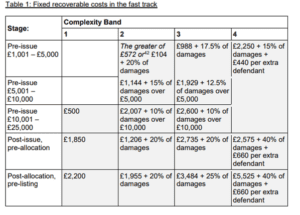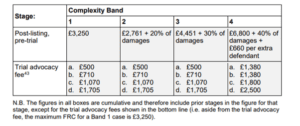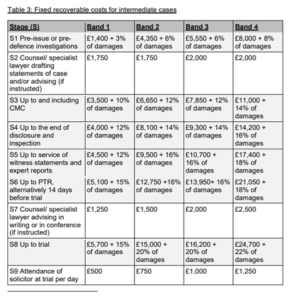Counting the cost – Upcoming changes to the Fixed Recoverable Costs regime
March 2023The implementation date for the Government’s proposed changes to the fixed recoverable costs (“FRC”) regime was originally last year. This followed Sir Rupert Jackson’s report into it in July 2017, the Government’s consultation on it in 2019 and the Government’s response to that consultation in September 2021.
It is now expected to be implemented in October 2023, subject to agreement by the Civil Procedure Rule Committee (“CPRC”). This news comes after Lord Bellamy KC’s address to the Civil Justice Council’s National Forum on 18 November 2022. The delay is said to be due to the complexity of the reforms and the need to give the legal industry more time to adjust to the new regime.
This article considers the proposed changes and their likely consequences for professionals and their insurers.
What are Fixed Recoverable Costs (“FRC”)?
FRC are the amount of legal costs that can be recovered by the winning party at different stages of litigation, from pre-issue to the final court hearing.
FRC were first implemented for road traffic accident (“RTA”) cases up to £10,000 damages in 2010 and are now in place for most fast-track cases concerning personal injury, RTA, employers’ liability and public liability.
Why extend FRC?
FRC help to ensure that legal costs remain both certain and proportionate, and thereby help to promote access to justice. On 31 July 2017, Sir Rupert Jackson produced a report that proposed extending FRC in civil litigation cases in England and Wales, on which the Government subsequently consulted.
In short, the outcome of that process is that the Government intends that FRC should be extended. However, it will still be possible for a party to leave the FRC in the Fast Track in “exceptional circumstances”.
How is the Government proposing to extend FRC?
In summary, the Government intends to implement the following proposals:
- Extending FRC to all other civil cases in the Fast Track, up to the value of £25,000;
- Expanding the Fast Track to include simpler “intermediate” cases valued between £25,000–£100,000 in damages. These will be cases that are not suitable for the High Court given their relatively low complexity and value. Sir Rupert initially proposed a new intermediate track to deal with these claims, but the Government considered that to be too costly;
- A new process and FRC for Noise Induced Hearing Loss claims; and
- The introduction of costs budgeting in “heavy” Judicial Review cases.
The bands
There will be four bands applicable to intermediate cases, and FRC will be calculated in relation to which band the claim falls into:
- Band 1: the simplest claims that are just over the current Fast Track limit, where there is only one issue and the trial will likely take up to one day;
- Band 2: the “normal” band for intermediate cases, with more complex claims falling into Band 3;
- Band 3: the “normal” band for complex intermediate cases that do not fall within Band 2; and
- Band 4: the most complex intermediate cases, where trial is likely to last three days and there are serious issues on breach, causation and quantum.
It appears that there will likely be a new Practice Direction with specific guidance on allocation to bands.
The Pre-Action Protocols may be amended to require parties to endeavour to agree the appropriate track for a case, and the appropriate band if the case is suitable for the expanded Fast Track. The claimant should state their proposal in this regard in the Letter of Claim, and the defendant should state their proposal in the Letter of Response.
On allocating a case to the Fast Track, the Judge will specify the band if it is in dispute. The parties may challenge that decision by an application on paper if they are unhappy with it.
The Government has stated that it does not consider it appropriate, at present, to give further guidance on band allocation and that it is for the parties and judges to come to sensible conclusions on banding, in light of the criteria set out.
In the appendix to this article are the proposed FRC tables. These will be subject to adjustment for inflation before being implemented, and the current Fast Track FRC rules on “London weighting” will continue to apply.
Expedited procedure
The intention is that those claims that have been allocated as intermediate cases will be subject to an expedited procedure. In summary, this involves:
- Statements of Case to be no longer than 10 pages;
- Written witness statements to stand as evidence-in-chief, with a party’s statements limited to 30 pages;
- Oral evidence to be limited to one expert witness per party (two, if reasonably required and proportionate), with each expert report limited to 20 pages (excluding photographs etc);
- Oral evidence to be time-limited and directed to the matters identified at the Case Management Conference (“CMC”); and
- All applications to be made at the CMC, as much is possible.
Professional negligence claims
If a professional negligence claim is valued between £25,000 and £100,000 then it may be suitable for FRC as an intermediate case, if it is not considered to be a “complex” professional negligence case.
There is very little information at present on how to judge this in practice, but the following criteria would appear to support a professional negligence case being suitable for FRC in principle:
- The case is valued between £25,000 and £100,000 and is not “complex;
- If the case is managed proportionately, the trial will not last longer than three days;
- There will be no more than two expert witnesses giving oral evidence for each party;
- The case can be justly and proportionately managed under the expedited procedure discussed above; and
- There are no wider factors, such as reputation or public importance, which make the case inappropriate for allocation as an intermediate case.
Part 36 offers
The Government intends to implement an uplift of 35% of FRC where a Part 36 offer to settle is made by one side, but not beaten by the other at trial.
The Government also intends to implement a 50% uplift of FRC where a party has engaged in “unreasonable behaviour”.
Comment
The Government’s intention to proceed with its proposed reforms to FRC, and accompanying expansion of the Fast Track, seems clear. This will be the next step in the Government’s wider reform of costs in civil justice that started with Sir Rupert’s 2010 report. He and the Government consider that the reforms recommended then (and implemented in 2013) have now bedded down sufficiently for the next round of changes to be introduced. It seems likely that these latest changes will substantially affect the cases to which they apply, and lawyers’ work on them.
It remains to be seen to what extent these reforms to FRC will affect claims concerning professionals and their insurers. The changes in question do not seem especially well suited to the complexities of many professional negligence claims and the significant reputational issues they frequently give rise to. It may well be that many such claims are simply valued too highly to be included in the expanded Fast Track, with its limit of £100,000 (down from the £250,000 suggested by Sir Rupert at one stage). The position may be less certain if there is a question over the “complexity” of the claim, especially because in our experience courts are keen to downplay complexity in claims in order to conserve judicial resources by moving cases out of the High Court where possible.
In any event, these reforms to FRC seem unlikely to be the final word on costs in civil litigation. Once these changes have bedded in we would not be surprised to see further proposals for costs reform from the Government, which may well affect professionals and their insurers further.
Appendix – Proposed FRC Tables












